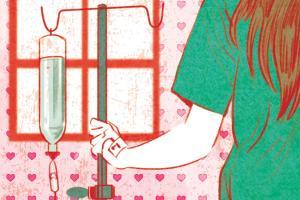Anxiety is compacted into a pellet, forbidden from taking up too much space. Whatever is unessential is switched off. I felt all this while in hospital with my mother all last week

Illustration/Ravi Jadhav
![]() In hospitals, time and space expand and contract until we feel ourselves residents of a different tube-lit planet echoing with murmurs, footsteps, beeps. Existence becomes pared down. Questions are short and unadorned: did the patient eat? Puke? Pass wind? Conversations have a geometrical economy. Sleep is bite-sized. The remnants of kajal in your eyes make themselves scarce. Messages are answered precisely, even effusion folded into neat phrases: thank you for being so helpful, so kind, for coming, for checking in. Anxiety is compacted into a pellet, forbidden from taking up too much space. Whatever is unessential is switched off. I felt all this while in hospital with my mother all last week.
In hospitals, time and space expand and contract until we feel ourselves residents of a different tube-lit planet echoing with murmurs, footsteps, beeps. Existence becomes pared down. Questions are short and unadorned: did the patient eat? Puke? Pass wind? Conversations have a geometrical economy. Sleep is bite-sized. The remnants of kajal in your eyes make themselves scarce. Messages are answered precisely, even effusion folded into neat phrases: thank you for being so helpful, so kind, for coming, for checking in. Anxiety is compacted into a pellet, forbidden from taking up too much space. Whatever is unessential is switched off. I felt all this while in hospital with my mother all last week.
ADVERTISEMENT
In the sci-fi sparse landscape, intimacy with strangers drips steadily through the days. Not of sharing stories, but of sharing physical space. Sharing a room with another patient, we become tolerant of the body's natural functions. Burps, farts, retching, moans—all are exposed and accepted with equanimity. On the next bed was a young woman whose fever remained undiagnosed for a month. The rhythm of her anxiety, checking and re-checking her temperature, intertwined with mine as my mother's temperature, sugar and blood pressure were monitored. Neither commented on the other but both knew the other knew. Annoyance with someone who talks too loudly on the phone, or watches too much cricket, seems to have contrasting political opinions, subsides into co-existence, even empathy. We are bodies, and illness is a leveller of sorts (though access to healthcare is not, of course).
I thought of words that bodily functions elicit commonly now: the Americanisms gross and 'eww.' They signal a new body culture, where the body must be all vitamin and vanilla.
Signs of mortality, decay, vulnerability, our animal self, are increasingly a source of revulsion and anxiety and we spend a lot of time discussing the body's 'wellness'. They also signal a new emotional culture. Ideas about privacy and personal space are transitioning in our society and we are quicker to read many more gestures as intrusive, even transgressive. It is now considerate to leave people alone unless they ask for our intervention. At the same time, we hesitate to 'trouble' others by asking for too much. In my own case, I see how that is read as forbidding, when I am anything but. We are more hesitant, more guarded, like antibodies, fearing our ability to survive other bodies, other ideas, other beings.
My mother's phone buzzed incessantly in the hospital. Dozens of missed calls, hundreds of messages, people wanting to visit and help. Many folks find this exasperating: why trouble the patient and caregivers to show your concern? Yet, this reaching out when things are down to essentials is actually the by-product of unessential things.
These are the overflow of interaction, the involvement with each other's every day, the endless talk about irrelevant and inessential details, the melodrama of emotion and soap-operatic, he-said-she-said incidents, the ability to risk irritation, boredom, exposure, to let a larger number of people into your space and be in theirs, in ways that are increasingly untenable and unimaginable for many of us. It can be suffocating, where the other way is freer, quicker, but also, starker. The balance of the two confronts us, as we think about the oncoming climate change of the heart, the epidemic of loneliness.
Paromita Vohra is an award-winning Mumbai-based filmmaker, writer and curator working with fiction and non-fiction. Reach her at www.parodevipictures.com
Catch up on all the latest Crime, National, International and Hatke news here. Also download the new mid-day Android and iOS apps to get latest updates
 Subscribe today by clicking the link and stay updated with the latest news!" Click here!
Subscribe today by clicking the link and stay updated with the latest news!" Click here!







